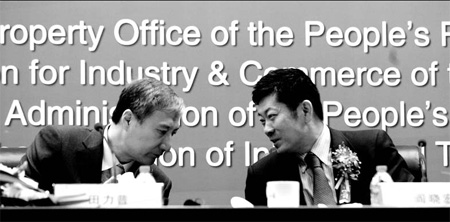'Common challenges require global cooperation'
Many intellectual property protection issues are common global challenges that require worldwide cooperation, Tian Lipu, commissioner of the State Intellectual Property Office, said at a high-level forum held in Beijing last Wednesday.
More than 350 representatives from various departments of the central government, foreign embassies, local intellectual property administrations, overseas organizations and companies from home and abroad participated in the event.
Both developed and developing nations are now exploring ways to build a better intellectual property system, promote national development and create social progress, Lu Yongxiang, vice-chairman of the Standing Committee of the National People's Congress, said in a congratulatory letter to the meeting.
"We should develop a balanced and effective intellectual property system based on the considerations of different development stages, economic circumstances and social context to pay attention to the interests of various parties," Lu said.
"Intellectual property is not an end in itself, but a means to promote public interest, innovation and access to science and technology," said Pushendra Rai, director of the World Intellectual Property Office.
"China's government has taken a determined and consistent position, continuing to increase efforts in intellectual property protection," Commissioner Tian said.
Since the Chinese patent law came into effect in 1985, it has been amended three times .
The latest revision, which took effect in October, 2009, seeks to balance the public interest and the rights of patent holders while preventing abusive patent rights, said Song Jianghua, deputy directory-general of SIPO Legal Affairs Department.
As the world seeks ways to address climate change, intellectual property should not turn into a technological barrier, said Zhu Xuezhong, professor at the Institute of Intellectual Property Strategy in Huazhong University of Science and Technology.
"We are not short of technologies to tackle climate change, but lack an effective mechanism to promote transfer and spread of technology," Zhu said.
Developed nations, stronger in technological solutions, have a major obligation for emission reduction as they generated a large amount of greenhouse gas in the early stages of their development, he said.
"They should transfer eco-friendly technologies in favorable terms and provide financial aid to developing countries that are now experiencing a rapid growth and facing more environmental challenges."
Yet intellectual rights on the majority of technologies are held by private companies. In the West, governments tend to oppose compulsory licensing of climate-friendly technologies, he noted.
Compulsory licensing has been used in sectors crucial to public interest like healthcare and medical treatment, but the approach "is not a cure for the thorny issue of technology transfer", Zhu said.
Yet opportunities for a great leap in energy technologies and their industrialization still exist.
Domestic invention patent applications in environmental technologies accounted for more than 80 percent of the nation's total in 2008.
Zhu suggested that China should make full use of the existing system and sharpen its proprietary innovation through implementation of the intellectual property strategy adopted in 2008, which will help the nation contribute to dealing with climate change as a responsible large nation.

Tian Lipu (left), commissioner of the State Intellectual Property Office, and Yan Xiaohui, vice-minister of the General Administration of Press and Publication, share opinions on intellectual property issues during the forum. Feng Yongbin / China Daily
(Source: China Daily)
2013-07-17 Print
Print